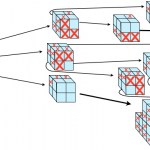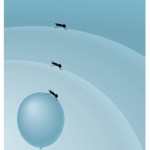singularity
“The aim of science is not to open the door to infinite wisdom, but to set a limit to infinite error.” -Bertolt Brecht
One of the most frequent questions I get about the Universe -- as a cosmologist -- isn't quite about the Big Bang in and of itself.
The expansion of the Universe in reverse; image source unknown.
The Big Bang is a remarkable idea, of course, that says that, based on the observations that the Universe is expanding and cooling today, it was hotter, denser, and physically smaller in the past. This gets particularly exciting when we extrapolate very far back in the history…
In 2007, my friends at m ss ng peces and I started work on a new Internet-television show called RESET, for the Sundance Channel. The idea was to make a show designed for computers to watch, that could teach them what it was like to be human -- a show that, while ostensibly made for human beings, would also nourish our computers' circuit boards with generous descriptions of the richness of human experience. Obviously this is just an artistic conceit, and not, as far as I know, a practicable reality, but it does raise a lot of interesting questions. You probably spend your entire day within…
One of Buckminster Fuller's most interesting conceits was his dislike of specialization, which he likened to a kind of intellectual prison, restraining "bright" people from truly understanding the complex, and general, systems of which they were a part. After all, he argued, what causes extinction in the animal kingdom? Overspecialization. Of course, it's logical, and it's s problem we see over and over again in human history, from the Industrial Revolution displacing specialized factory workers to the often daunting gap of comprehension between the social and "hard" sciences. As soon as we…
The Large Hadron Collider is finally turning on.
A quick step backwards: the LHC is a particle accelerator, the largest of its kind, underwritten by all the wild money in science, a ringed tunnel some 27 kilometers long, deep underground, crossing the French-Swiss border at four points. It's been over twenty years in the making and has garnered the support of 10,000 scientists in 85 countries behind its unimaginable modus operandi: to recreate the environment of our universe as it was less than a millionth of a second after the Big Bang, and hence to reveal, among other things, the…
This month's issue of Physics Today has an interesting article by Robert Brandenberger of McGill University, entitled Alternatives to Cosmological Inflation. As a refresher, cosmological inflation is the theory that sets up the Big Bang: it takes whatever was in the Universe prior to inflation and expands it away, leaving you with a Universe that has roughly (to a few parts in 100,000) the same properties everywhere, and is spatially flat.
There are many models of inflation which give a Universe like ours, although we have to fine-tune the parameters of it. For instance, if we treat…


